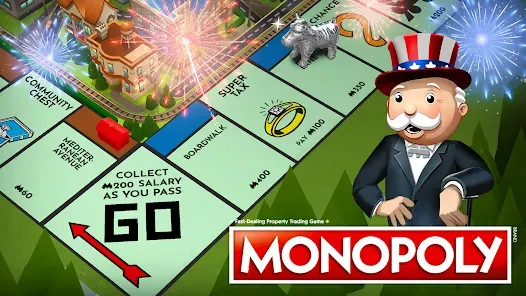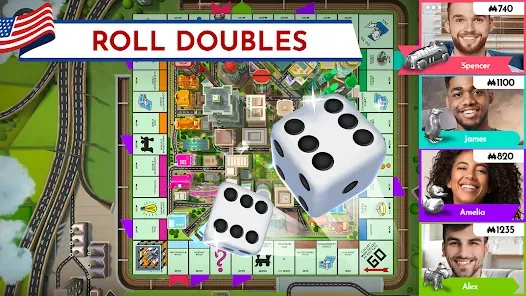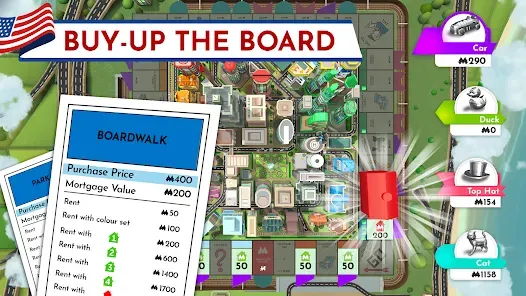MONOPOLY: Your Guide to Becoming the Ultimate Real Estate Tycoon
Welcome to the thrilling world of MONOPOLY, where your strategic prowess in real estate and negotiation will be tested to its limits. This timeless board game tasks you with a singular goal: meticulously build a colossal property empire, drive your opponents into bankruptcy, and reign supreme as the undisputed real estate mogul. While a touch of luck with the dice can certainly help, true mastery of MONOPOLY hinges on astute decision-making, cunning trades, and a deep understanding of the game’s evolving phases.
This guide will equip you with the strategies and insights needed to navigate the classic board, leverage every opportunity, and outmaneuver your rivals on your journey to financial domination.

Mastering the Board: Key Strategic Phases
Success in MONOPOLY isn’t about random rolls; it’s about adaptive strategy across different stages of the game.
Early Game: Acquisition & Monopoly Formation
The initial turns of any MONOPOLY game are crucial for setting up your foundation.
- Prioritize Acquisitions: Your primary goal in the early game is to acquire as many properties as possible. Every unowned property you land on is an opportunity. Even if you don’t complete a full color set immediately, owning properties denies them to your opponents and gives you trading leverage later.
- Focus on Strategic Sets: Not all monopolies are created equal. Focus on acquiring properties that, once monopolized, will yield a strong return without excessive investment.
- Light Blues & Oranges: These are often considered the most valuable early-to-mid game monopolies. They are relatively inexpensive to develop, yet their rents, especially with houses, can quickly drain opponents’ funds. They also have a high probability of being landed on due to their proximity to Jail and Go.
- Railroads: Owning all four railroads provides a steady, reliable income of $200 each time an opponent lands on one. This passive income is invaluable, especially as cash gets tight in the later stages.
- Utilities: While less lucrative than railroads, owning both utilities can provide a decent income based on dice rolls, which adds another layer of financial pressure on opponents.
- Utilize Auctions: If another player declines to purchase a property they land on, it goes up for auction. Always participate in auctions, especially for properties that could complete your sets or prevent an opponent from completing theirs. Bid strategically, knowing your budget and the property’s true value to your overall plan.
Mid Game: Development & Income Generation
Once properties are largely acquired, the game shifts to development and leveraging your assets.
- Build Smart, Build Early: As soon as you complete a color group (a monopoly), start building houses. It’s generally agreed that building 3-4 houses is the most cost-effective investment, as the rent jumps significantly for these increments.
- Example: A property’s rent dramatically increases between having no houses and three or four houses. Beyond that, the return diminishes relative to the investment needed for hotels.
- Strategic Mortgage: Don’t be afraid to mortgage less strategic properties (like those in a single property group, or sets you don’t intend to develop) to fund the purchase of houses or hotels on your developed monopolies. While mortgaged properties don’t collect rent, unlocking building potential on your best sets is far more valuable. You can always unmortgage them later when cash flows.
- Initiate & Engage in Trades: This is where true MONOPOLY masters shine. Actively seek out trades that benefit you.
- Complete Your Monopolies: Your top priority in trading should be completing your own color sets.
- Block Opponents: If you can acquire a property that prevents an opponent from completing a profitable monopoly, it can be a wise move, even if it doesn’t directly contribute to your own set.
- Negotiate Fairly (But Firmly): Don’t be overly generous, but offer deals that provide clear value to both parties. Cash, properties, and even “get out of jail free” cards can be part of a trade.

Late Game: Financial Domination & Opponent Elimination
The end game is all about financially crushing your opponents.
- Target Weaknesses: Identify players who are low on cash or heavily mortgaged. Focus your efforts on forcing them to land on your most expensive properties.
- Max Out Key Monopolies: Convert houses to hotels on your highest-trafficked and most expensive color groups (e.g., Green and Dark Blue, if you’ve managed to acquire and develop them). This will deliver the ultimate blow to opponents’ dwindling cash reserves.

- Manage Your Cash/House Supply: Be mindful of the finite number of houses and hotels available in the game. If you can acquire properties that others want to develop (especially in sets that are nearing completion for other players), you might be able to cause a “building shortage,” preventing your opponents from increasing their rent income.
- Ruthless Collection: Do not waiver when collecting rent. Every dollar counts. Bankruptcy is the goal.
Advanced Tactics & Considerations
Elevate your game beyond basic strategy with these nuanced approaches.
The Power of Negotiation
Trading is arguably the most complex and rewarding aspect of MONOPOLY.
- Understand Value: Know the inherent value of each property (rent potential, cost to develop, location on the board) and assess its value to you versus its value to your opponent.
- Create Desperation: If an opponent desperately needs a property to complete a set, and you hold it, you hold all the leverage. Demand high compensation (cash, multiple properties, etc.).
- Bluffing and Psychology: Learn to read your opponents. Can you convince them a trade is better for them than it really is? Sometimes, trading away a seemingly key property can be worth it if it cripples an opponent or frees up cash for your own devastating development.
Understanding Risk & Reward
- Chance & Community Chest: These cards introduce an element of calculated risk. They can offer significant windfalls or impose harsh penalties. Embrace the unpredictability; sometimes a chance card is exactly what you need to escape a tight spot or collect unexpected income.
- Jail Strategy: Landing in Jail isn’t always a negative. In the early game, you often want to get out quickly to buy properties. In the late game, especially if you have developed monopolies, being in Jail can be advantageous – you still collect rent from your properties, but you avoid landing on opponents’ expensive spaces. Consider staying in Jail for a few turns if the board is dangerous.


General Tips for Success
- Cash Flow is King: While owning properties is the goal, never let your cash reserves dwindle too low unless you’re investing in a game-winning development. You need cash for rent, taxes, and unexpected events. Passing GO for $200 seems minor, but it adds up!
- Know the Rules (and House Rules): Ensure you and your opponents are aligned on any custom house rules (e.g., Free Parking jackpot, modified GO salary). These can significantly alter optimal strategy.
- Adapt to the AI/Opponents: Playing against predictable AI requires different tactics than playing against savvy human opponents who can negotiate creatively or hold grudges. Adjust your aggression and diplomacy accordingly.
- Don’t Be Afraid to Mortg: Seriously, it’s a vital tool to raise capital. Just remember the cost to unmortgage.
MONOPOLY is a brilliant blend of luck, economics, and social interaction. While the dice rolls can often feel arbitrary, consistent strategic play will vastly increase your chances of becoming the ultimate real estate titan. So, gather your tokens, prepare your negotiating skills, and roll the dice to build your empire!